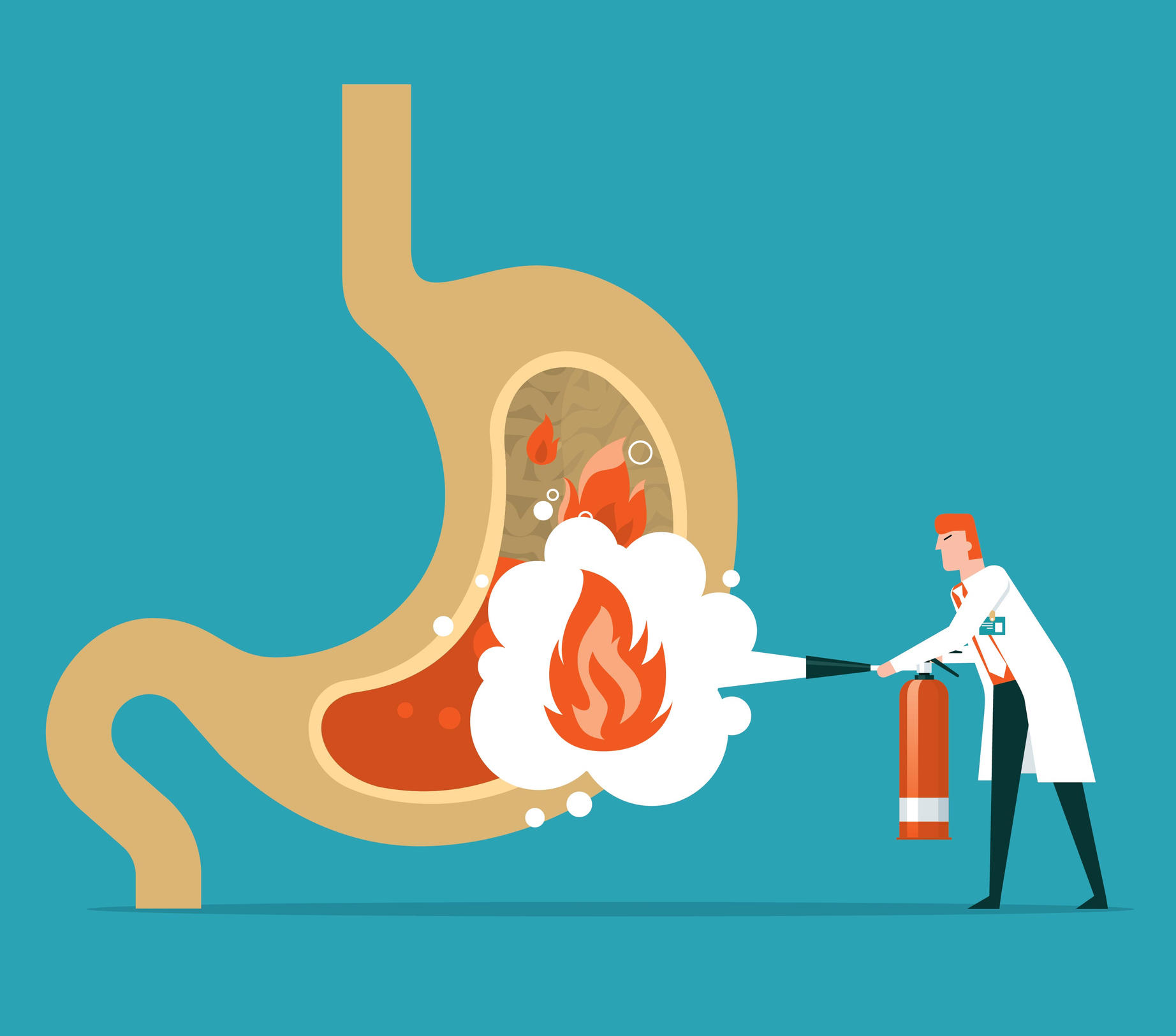Esomeprazole vs Omeprazole: What's the Difference and Which Is Better for Treating GERD and Heartburn?
By Jillian Foglesong Stabile MD, FAAFP, DABOM
September 24, 2025

Esomeprazole vs Omeprazole: What's the Difference and Which Is Better for Treating GERD and Heartburn?
Esomeprazole (Nexium) and omeprazole (Prilosec) are closely linked medications used to treat heartburn, stomach ulcers, and gastroesophageal reflux (GERD), also known as acid reflux. Both medications are known as proton pump inhibitors (PPIs). These medications treat prevalent conditions, affecting as many as 10-20% of people in the Western world and up to 28% of people in the United States. Choosing the best medication for treating your reflux symptoms can be challenging, and there are several medications available for treatment. Esomeprazole vs omeprazole (or prilosec vs nexium) may be one potential option you're considering. So, what's the difference between these medications, and which is better for treating GERD and heartburn? This guide will explore the similarities and differences between these two related medications.
What is omeprazole?
Omeprazole is in a class of medications called proton pump inhibitors. In addition to esomeprazole, other medicines in this class include pantoprazole, lansoprazole, and rabeprazole. Omeprazole is available as a generic medication and is also marketed under the brand name Prilosec. If the question on your mind is whether Prilosec and omeprazole are the same thing, the answer is yes. Omeprazole works by blocking a hydrogen/potassium pump in the stomach, which is the final step in the production of stomach acid. Omeprazole works quickly within an hour of taking the medication, and the effects peak at two hours. The acid-blocking effects of omeprazole will last for up to three days, and acid production will return to normal after three to five days. If taken regularly, the effects of omeprazole will stabilize at around 4 days.
What is esomeprazole?
Esomeprazole magnesium is also a proton pump inhibitor. Like omeprazole, esomeprazole binds to the hydrogen/potassium pump in the stomach. By blocking this pump, esomeprazole decreases the amount of acid released into the stomach. Esomeprazole is also marketed under the brand name Nexium, in addition to being available in a generic form.
Why take esomeprazole vs omeprazole for treating gastritis?
Gastritis is a type of stomach inflammation. Gastritis is most commonly classified as either acute or chronic. Gastritis can be caused by several potential causes, including:
- Bacterial infections
- Viral infections
- Fungal infections
- Parasitic infections
- Inflammatory diseases: Crohn's, sarcoidosis, vasculitis
- Exposures: chemicals, alcohol, radiation
- Other conditions: allergic, eosinophilic, lymphocytic, gallbladder disease
Gastritis is generally a painful condition and can increase the risk of several health conditions, such as anemia, low platelets, and even stomach cancer. Due to these risks, it is crucial to take medication to manage the inflammation. PPIs, including esomeprazole magnesium vs omeprazole (or Nexium vs prilosec), are one of the first-line medications for treating this condition.
Omeprazole vs esomeprazole magnesium: What is the difference?
These medications are similar, but what's the difference between omeprazole and esomeprazole?
| omeprazole | esomeprazole | |
| onset | fairly rapid | rapid |
| duration | shorter | longer |
| drug interactions | more | fewer |
| dosing frequency | one or two times daily | one or two times daily |
| take with food | 30 mins prior | with or without |
When comparing esomeprazole magnesium to omeprazole, several factors should be considered. The different composition of these two medications affects how they are processed. Esomeprazole is processed more slowly than omeprazole and may remain effective for longer periods of time. Because it is processed differently from omeprazole, it may have fewer interactions with other medications. Omeprazole should be taken on an empty stomach, about 30 minutes to an hour before eating or taking other medications. Esomeprazole can be taken with or without food, but may be more effective if taken on an empty stomach. Both medications may be taken once or twice daily, as directed by your healthcare provider.
Is esomeprazole the same as omeprazole?
Esomeprazole can be considered a cousin of omeprazole. Specifically, esomeprazole is the S-isomer of omeprazole. Many medications are made up of a combination of right and left mirror images (called R- and S-isomers) of the medication. Omeprazole is one of these medications. Esomeprazole is comprised of only one of these mirror images, S-esomeprazole. So, while esomeprazole and omeprazole are very similar medications, they are not the same.
Is Omeprazole as good as Esomeprazole?
Omeprazole and esomeprazole are both good medications for treating heartburn, acid reflux, and stomach ulcers, but is omeprazole as good as esomeprazole? A 2004 study in the European Journal of Clinical Pharmacology evaluated how well esomeprazole controlled stomach acid compared to other proton pump inhibitors, including omeprazole. This study found that esomeprazole at a 40mg dose provided greater stomach acid suppression for a more extended period than the other PPIs. A 2001 study in The American Journal of Gastroenterology compared esomeprazole and omeprazole in patients with erosive esophagitis. This study found that esomeprazole was significantly more effective in healing esophageal erosions than omeprazole. So, while omeprazole works very well to treat patients with GERD, stomach ulcers, and gastritis, esomeprazole may be more effective in some populations.
What side effects are common between omeprazole and esomeprazole?
Proton pump inhibitors often have similar side effects. Omeprazole and esomeprazole have many similar side effects, including:
- Headaches
- Nausea
- Vomiting
- Diarrhea
- Constipation
- Abdominal pain
- Flatulence
- Dizziness
- Back pain
- Cough
- Rashes
- Taste changes
Other potential side effects may be shared between esomeprazole and omeprazole. These are among the more common.
What side effects are not common between Nexium and Prilosec?
The side effects between Nexium and Prilosec are very similar, but there are a few differences. Prilosec, or omeprazole, is more likely to cause anxiety and dizziness than Nexium, or esomeprazole. Omeprazole may interact with more medications than esomeprazole due to the differences in how the medicines are processed in the body. Omeprazole may increase the risk of interaction and decrease the effectiveness of certain blood thinners, such as Plavix or clopidogrel. A recent study evaluating this relationship found that the data regarding this interaction are mixed, and there doesn't appear to be an increase in poor outcomes from the combination.
How successful is omeprazole in treating GERD and heartburn?
Omeprazole has been shown to be successful in treating GERD and heartburn. A 2000 study found that approximately 62% of individuals taking 20 mg of omeprazole daily and 41% of those taking 10 mg of omeprazole daily experienced relief from their GERD symptoms. A more recent study evaluated patients with acid reflux peptic disease (patients with ulcers and reflux). This study showed that omeprazole provided significant relief in these patients. This group of patients was evaluated on days 14 and 28 of treatment, and 46-68% of these patients had improvement in their symptoms.
How successful is esomeprazole in treating GERD and heartburn?
As mentioned previously, a 2004 study comparing esomeprazole to other PPIs showed that esomeprazole was more successful in reducing stomach acid than other PPIs. A 2020 meta-analysis showed that esomeprazole treatment significantly improved heartburn, epigastric pain, and relapse rates in people with GERD. A 2001 study in The American Journal of Gastroenterology found that taking esomeprazole for 6 months improved both GERD and prevented the recurrence of erosive esophagitis.
Is Nexium better than Prilosec for acid reflux treatment?
Nexium has been shown to reduce stomach acid levels more than Prilosec and other PPIs. However, Nexium also has a slightly increased risk of side effects compared to other PPIs.
FAQs
Can you switch from omeprazole to esomeprazole?
Yes. You can switch between any of the PPIs if your healthcare provider recommends switching. Your healthcare provider may recommend one medication over another for several reasons, depending on your unique health needs.
Which is better: omeprazole or esomeprazole or lansoprazole?
A 2004 study found esomeprazole to be more effective than omeprazole, lansoprazole, or other proton pump inhibitors (PPIs) in treating stomach acid.
Can you take omeprazole and Nexium on the same day?
Omeprazole and Nexium (esomeprazole) are two medications in the same class. While you can switch between them, it is not recommended to take the medicines at the same time or on the same day. Taking two PPIs on the same day increases the risk of side effects, including abdominal pain, diarrhea, headaches, and nausea.
Are Prilosec and omeprazole the same thing?
Yes, omeprazole is the same as Prilosec. Prilosec is just a brand name. If you're considering omeprazole versus Prilosec, you may want to choose the one that is less expensive.
Nexium versus Prilosec: Which is safer?
Nexium and Prilosec are both very safe medications. The side effects of these medications are similar. Nexium may have a lower risk of interactions with other medications than Prilosec due to its unique liver processing. However, because Nexium is likely stronger than Prilosec for decreasing stomach acid, there is also a slightly increased risk for side effects.
Do Nexium or Prilosec increase the risk of dementia?
In 2019, a small study raised significant concerns about whether the use of PPIs increased the risk of dementia. However, multiple studies since then have shown that there is no increased risk of dementia in patients who are using PPIs. Research is ongoing related to this risk.
Get your free ScriptSave® WellRx account and start saving on your medications
Medications are expensive, and their costs can vary significantly between pharmacies, even those located across the street. If you are experiencing heartburn or other symptoms of reflux, or if your healthcare provider has recommended medication, you may be wondering how to save money on your prescriptions. Consider visiting us at WellRx. Some people save a little. Some people save a lot. Prices vary across zip codes. Even pharmacies across the street from each other can have huge price differences. Our goal is to bring transparency to prescription medication pricing, enabling consumers to keep more money in their pockets. ScriptSave has been helping consumers save on their prescriptions for 25 years.
References
https://www.ncbi.nlm.nih.gov/books/NBK441938/
https://pmc.ncbi.nlm.nih.gov/articles/PMC8754510/
https://www.mayoclinic.org/drugs-supplements/esomeprazole-oral-route/description/drg-20074322
https://www.ncbi.nlm.nih.gov/books/NBK539786/
https://www.healthline.com/health/gerd/nexium-vs-prilosec
https://medlineplus.gov/druginfo/meds/a699054.html
https://www.ncbi.nlm.nih.gov/books/NBK544250/
https://www.sciencedirect.com/science/article/abs/pii/S0002927000023935
https://www.pharmgkb.org/pathway/PA152530846/pathway
https://www.nhs.uk/medicines/esomeprazole/how-and-when-to-take-esomeprazole/
https://pubmed.ncbi.nlm.nih.gov/15349707/
https://www.drugs.com/compare/esomeprazole-vs-omeprazole
https://www.drugs.com/sfx/esomeprazole-side-effects.html
https://pubmed.ncbi.nlm.nih.gov/10871975/
https://pmc.ncbi.nlm.nih.gov/articles/PMC10428080/
https://pmc.ncbi.nlm.nih.gov/articles/PMC8215048/
https://www.sciencedirect.com/science/article/abs/pii/S000292700002236X
https://www.nature.com/articles/s44355-024-00012-w
https://www.neurology.org/doi/10.1212/WNL.0000000000207747
https://alz-journals.onlinelibrary.wiley.com/doi/10.1002/alz.13477
Recommended Articles









